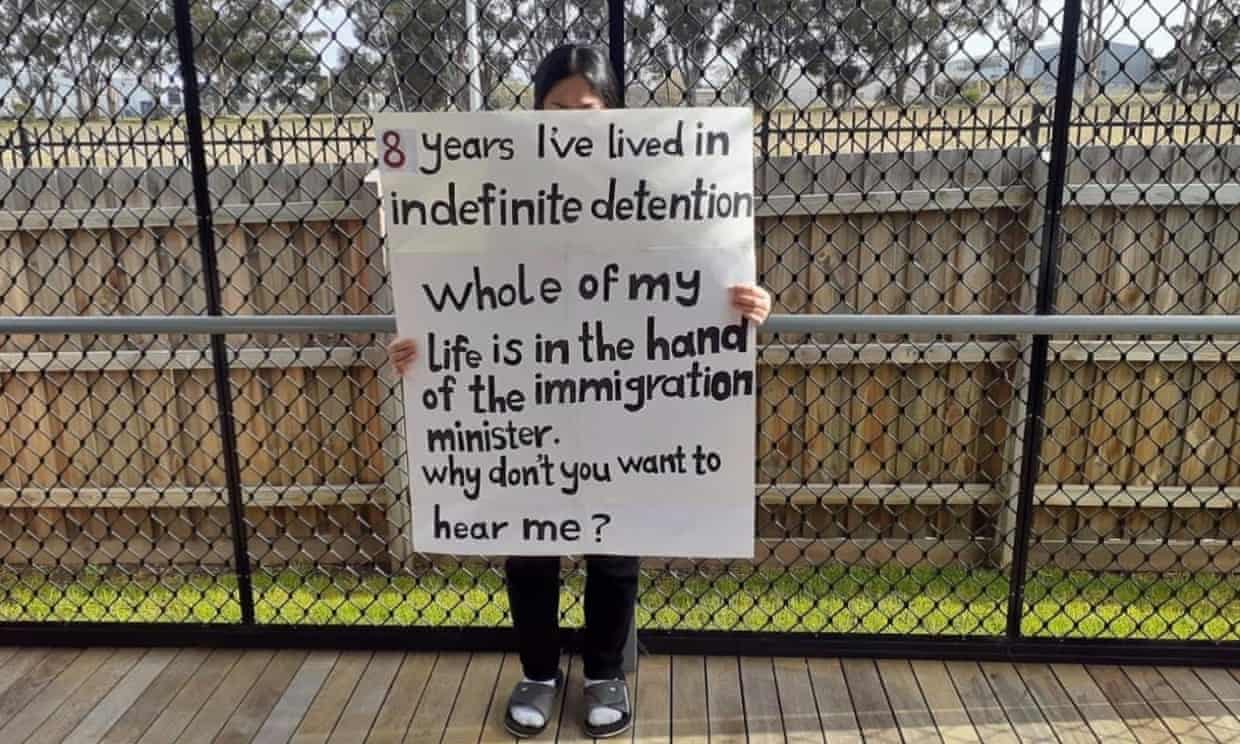
Ellie
“I have been left like a worthless object in a corner of a prison …. Every day, I sink deeper into the swamp of fear and despair. But no one hears me.” Ellie is a 34-year-old Iranian refugee who fled Iran in 2013 to escape family violence. She attempted to reach Australia and apply for asylum. Australia shipped her off to Nauru, where she spent six years in detention. Then, Australia shipped Ellie to Melbourne, where she has spent the past 20 months in detention. Ellie is part of the `deal’ between the United States and Australia to `address’ the `situation’ on Nauru and Manus Island. Ellie is the last woman refugee in Australian detention. Because of Covid, she couldn’t have her interview with the U.S. Department of Immigration, and so was dumped in the Melbourne Immigration Transit Accommodation, or MITA, a place of neither transit nor accommodation. Eight years ago, refugee and asylum seekers at MITA went on hunger strike. Their request was simple: “Please release us into the community or please kill as on the mercy basis.” That’s where Ellie has been for the past 20 months. Because the U.S. hasn’t yet processed her application and so hasn’t yet decided on her case, she can’t apply to Canada. Because the Australian Department of Home Affairs has refused to issue a visa, Ellie can’t stay in Australia, and so she is currently scheduled for deportation to Nauru. Where irony died, cruelty reigns.
Over a hundred Australian-based academic researchers and experts in migration and refugee studies, including in Australian refugee law, history and policy sent an open letter to the Minister of Home Affairs: “We are extremely concerned about the effects of closed immigration detention on women refugees and asylum seekers in Australia. We are writing to express particular and urgent concern in relation to the prolonged immigration detention of one woman refugee in the Melbourne Immigration Transit Accommodation closed immigration detention facility who suffers from a range of health issues as a result of her previous detention on Nauru …. For women, in particular, immigration detention can be a place of heightened physical and sexual violence. Women in detention not only suffer the effects of prolonged, indefinite incarceration but they may also live in constant fear for their bodily safety and integrity …. In addition, routine practices such as room inspections and bodily searches within immigration detention can cause particular gendered harms …. For survivors of gender-based violence, such practices of routine or unannounced room checks and body searches can make the already-punitive experience of immigration detention extremely distressing. For such women, being involuntarily subjected to invasive body searches or room inspections also can be directly re-traumatising. It means that they are likely to experience immigration detention as an unsafe place where they lack bodily autonomy and their consent or privacy is disregarded. We respectfully ask that you act immediately to release any women refugees or asylum seekers who are being held in closed immigration detention. In particular, we draw your attention to the situation of Ellie, referred to above, and respectfully request that you grant her a permanent visa so that she can live in the Australian community.”
Since 2013, Australia has effectively kidnapped scores of asylum seekers and refugees and shipped them off to detention center in Nauru and Manus Island. From the very beginning, reports of the torture of women, children, men circulated, and Australia shrugged its shoulders at that torture of the innocents. Australia was not shocked by the torture of refugees and asylum seekers. It was occasionally shocked by their survival. Australia was not, is not shocked, `shocked’, or SHOCKED at the torture of Ellie. “I have been left like a worthless object in a corner of a prison …. Every day, I sink deeper into the swamp of fear and despair. But no one hears me.” Ellie is a 34-year-old Iranian refugee who fled Iran in 2013 to escape family violence. For three years, Ellie has been described as “in limbo”. Ellie is not in limbo. She’s in hell … and absolutely no one is shocked.
(By Dan Moshenberg)
(Photo Credit: The Guardian / Saba Vasefi)